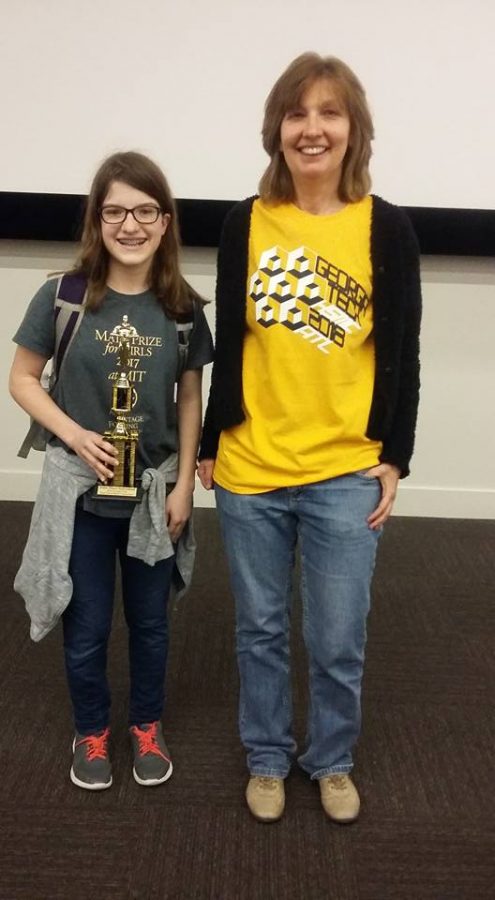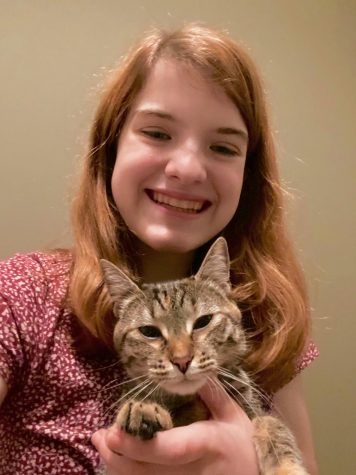Women in STEM Blazing New Trails: Dr. Rachel Kuske

Photo courtesy of Georgia Tech.
Cossaboom and Dr. Kuske at the Georgia Tech High School Math Competition on March 10, 2018.
March 25, 2019
It’s Women’s History Month, and there are women blazing trails in every sector, including male-dominated STEM fields. In the discipline of mathematics, we have one such trailblazer here in Atlanta — Dr. Rachel Kuske, the first woman to serve as the chair of the math department at Georgia Tech. She is a professor known for her research in applied mathematics fields. Kuske attended the University of Wisconsin Green Bay for undergraduate and then went to Northwestern University for graduate school. She was also a postdoctoral researcher at Stanford and worked at the University of British Columbia, serving as the chair of UBC’s math department, before moving to Georgia. She is passionate about spreading her love of mathematics to a wide audience and increasing its accessibility for girls. Kuske was initially drawn to math because of its analytical side.
“I like the puzzle element of [math], but I also liked the fact you could use math in a lot of practical things,” said Kuske during a recent interview with the Blue and Gold.
Kuske realized during college that math was going to be her future.
“When I started in university, I actually was primarily a music major but I was just doing math, but then I realized that maybe it was a better career plan to do the math and just do the music for fun,” said Kuske. “[Math] was fun and I […] had good teachers, so I got exposed to a lot of things.”
During high school, Kuske participated in math competitions and took advantage of various opportunities her school offered.
“I think there were fewer competitions when I was in high school, but there were some,” said Kuske. “I [also] learned to do a little bit of programming. I took some extra courses [like calculus].”
As a woman in a STEM field, Kuske has seen the gender imbalance in her field firsthand. According to the National Science and Engineering Indicators Report, although women made up one-half of the workforce, they accounted for only one-third of science and engineering employment in 2015, the most recent year for which data can be found. In particular, women made up just 25% of the computer and mathematical science workforce. However, strides have been made. The number of women in the science and engineering sector has more than doubled from 1993 to 2015.
Kuske believes that her perspective as a minority affected her experiences throughout her career.
“I think [my experiences were] different. It’s different for anybody who’s an underrepresented group in a field,” said Kuske. “I don’t think that’s been bad, and I’ve certainly come during a time where there’s been a lot of interest in trying to get more women in math and science and engineering in general.”
Kuske sees the importance of empowering women to overcome these societal stigmas.
“I’ve certainly hit examples where people have said, ‘Oh, women can’t do math,’ or just felt like I wasn’t always included,” said Kuske. “But I think that’s true of anybody who is in an underrepresented group. I think that’s why it’s important to get more women in so everybody has the same feeling.”
Kuske was able to overcome these obstacles due to the support of her colleagues.
“I think I was fortunate that I had a lot of good colleagues,” said Kuske. “I worked with people who were doing math both in undergrad and in graduate school, so there were always peers around who were supportive and people to work with, so you could feel like you’re not isolated.”
Kuske’s drive for problem solving empowered her.
“I’m a problem solver, so if there’s a question, I always want to find the answer. [I’m] determined to figure that out, so it’s just always a challenge,” said Kuske.
Kuske’s role as a professor gives her an outlet to research topics that excite her.
“Sometimes, I’m doing the basic research to explore, just calculating things by hand and doing some computing and trying to bring those together,” said Kuske. “Usually, I’m doing modeling of an applied, motivated problem, and so I’ll run some simulations but also do some hand calculations and see if we can explain why this model has a particular behavior.”
One of Kuske’s research projects involves energy harvesting.
“I have a postdoc [student],” said Kuske. “We’re working on modeling a new type of energy harvester, a device that generates energy, but you can also harvest the energy from motion. You want to know dynamically how the thing behaves and then from that how much energy is going to come out. It’s fun and we’re working with an engineer who is building it, so that’s interesting.”
Kuske is also working on other projects.
“We also have some other problems, more related to data science and machine learning, […] studying computational algorithms and how they perform,” said Kuske.
As the chair of her department, Kuske coordinates various programs that the math department is hosting for the college students and the Atlanta community.
“I have a slightly different mix than most of my colleagues because I’m also the chair,” said Kuske. “We might be thinking about what courses we’re going to offer or […] hiring the graduate students or the postdocs or hiring new faculty. [We might also be] thinking about some other program that’s going to run in the school or planning the high school math competition.”
The job of a professor also involves another role.
“I’m not teaching right now, but if I was teaching, part of [my job] would be either teaching or preparing my lectures,” said Kuske.
When advising younger students, Kuske recommends high schoolers explore all the options available to them, including opportunities for competitions and summer enrichment. In particular, she cites a program she helped with while she was a postdoc at Stanford.
“[Stanford University Mathematics Camp (SUMaC)] was a really good program,” said Kuske. “I think the nice thing about that is students would come and they might be one of just a few students who are really into math in their high school, and then they would go there and they would be like, ‘Wow! There are all these people and they’re all into math!’ so I think that’s also just a really good way to see how things work.”
Kuske suggests that girls empower themselves by having a constructive frame of mind.
“If you do run into anything where people say, ‘Hey, you’re a girl, why are you doing that?’ […] that’s an outdated thing,” said Kuske. “Don’t think of it as ‘I’m a girl doing math.’ Think of it as ‘I’m a smart student doing math.’ There shouldn’t really be anything special about a girl doing it, but at the same time, I think it’s good to find other girls that are into math. […] There is nothing wrong with doing the girl thing with math, but also don’t let that define your interest in math.”
Kuske finds it important for girls to realize they can stick to their passions regardless of what their peer group may believe.
“I think the other thing that I’ve seen, sometimes not just with girls but maybe more commonly, is to say, ‘Well, I don’t know if I want to do that in university because maybe my friends aren’t doing it,’” said Kuske. “[Don’t] let that stop you because you will find other people in university and there will be a lot more people who are interested in it and you’ll have lots of opportunities.”
Realizing the sheer amount of opportunities available can also be very beneficial.
“Sometimes, people also say, ‘Well, I don’t know if I really want to do that because it doesn’t connect with the type of career I think I want to have,’” said Kuske. “I think that’s where finding out about all the different types of careers you can do, which is actually a huge number [can be very impactful].”
The gender gap tends to emerge in specific areas of the field.
“I think the tricky thing is, so we see especially at high school and even undergrad kind of 50/50 math majors, but what we tend to see is then going into graduate school or certain fields, we lose that,” said Kuske.
Kuske believes that spreading awareness about collaboration and the creativity of math can have a massive impact on students.
“Sometimes we are putting a lot of emphasis on competition as opposed to teamwork, and I think we could do more already in undergrad to give people the sense that ‘Oh, there are lots of different directions I can go with this and math is not just this thing you do sitting at your desk,’” said Kuske. “There are all different ways that math can be involved, so I think it’s more than awareness of how math shows up in different ways, and I think that will help over time.”










